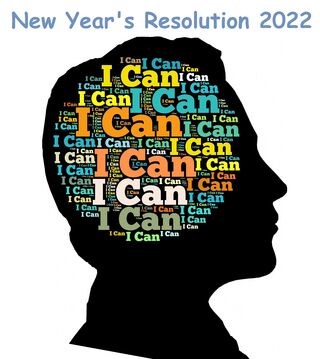Media
New Year's Social Media Resolutions
What "mental password" reminds you of your goals for 2022?
Posted January 4, 2022 Reviewed by Vanessa Lancaster
Key points
- A mental password is a word, phrase, motto, or nickname to remind you of your New Year's resolutions.
- Create a cognitive motto to strengthen your resolve to make next year better.
- Before posting on social media, ask yourself how much you desire approval ("likes") or whether your comments are overly harsh or judgmental.

Our thoughts often turn to our New Year’s Resolutions at this time of year. This is a good time to reflect back on a challenging year, review the positives and negatives, and renew our goal to make next year better.
You can start by doing some cognitive self-therapy homework to create a motto that captures your future aspirations.
A good question to ask yourself is: "What’s my password–to remind me who I aspire to be in 2022?"
An example of a password could be: “This will be my year!” or “Listening to my better angels.”
Specific and positively worded resolutions usually work best. A goal of "lose pandemic pounds" may be too self-critical and general. Instead, plan to take specific positive actions in small, doable steps: "Take a walk after work," or "Skip carbs at lunch" are more positive and achievable goals. Customize your mental password to kick start your motivation, and keep your goals for 2022 front and center.
Another good New Year's resolution would be for all of us to “unplug” from the digital realm more often to interact with each other in person a bit more. We adapted to the pandemic by social distancing for our health. We found new ways to socialize with digital devices and connections.
Moving forward, we must continue to meet safely in a still uncertain health environment. However, in 2022, we have better knowledge about the virus and better protection with vaccines. Maybe we'll resolve to find ways to get out and safely meet in person some more this year?
Negativity in Social Media. There has been a lot of controversy of late about the negative tone of social media posts. Online discourse on social media often amplifies conflict with speech that is caustic, grandstanding, or judgmental.1 Perhaps we could also adopt a New Year’s resolution to create a kinder, gentler social media experience?
Rather than wait for others to filter negative online content–we can resolve to create a kinder social media environment through our own behaviors. So many users spend too much time trying to impress others by posting carefully curated photos, seeking “likes” or other confirmation. Inevitably, something won't measure up, and we may receive harsh or judgmental comments that result in hurt feelings.
Teens are especially sensitive, and some react with negative self-image, social withdrawal, or even depression. Since it is not realistic to ask teens to avoid the digital social square–let's try to improve the tone within the social media environment.
Let's also have conversations with young people and each other, so we are more aware of the pitfalls of social media exposure, and avoid over-reacting to toxic messages. In this way, we can contribute to building personal resilience by teaching each other how, and even if, to respond online.
To paraphrase Dale Carnegie, when we live for “likes,” we put ourselves in others' hands. Instead, we resolve to be less concerned with others' approval and more concerned with promoting positive expression and avoiding negativity on social media.
In the New Year and beyond, before posting online, first ask yourself: “Am I being too judgmental?" or "How will I handle it if I receive unkind comments?” Whenever you post online, pause to consider the power of your words to hurt, shame, or blame. Put the golden rule on autoplay, and ask yourself: “How would I feel if this comment was directed at me?”
We can create a mental password to remind us to be more self-validating, and to purposely present a kinder online persona in the future. Let's create a more positive conversation!
Password: “Be Kind in 2022”
References
(1) JB. Grubbs, B. Warmke, J. Tosi, A.S. James, W.K. Campbell. (2019). Moral grandstanding in public discourse: Status-seeking motives as a potential explanatory mechanism in predicting conflict. PlosOne Published: October 16, 2019 https://doi.org/10.1371/journal.pone.0223749


